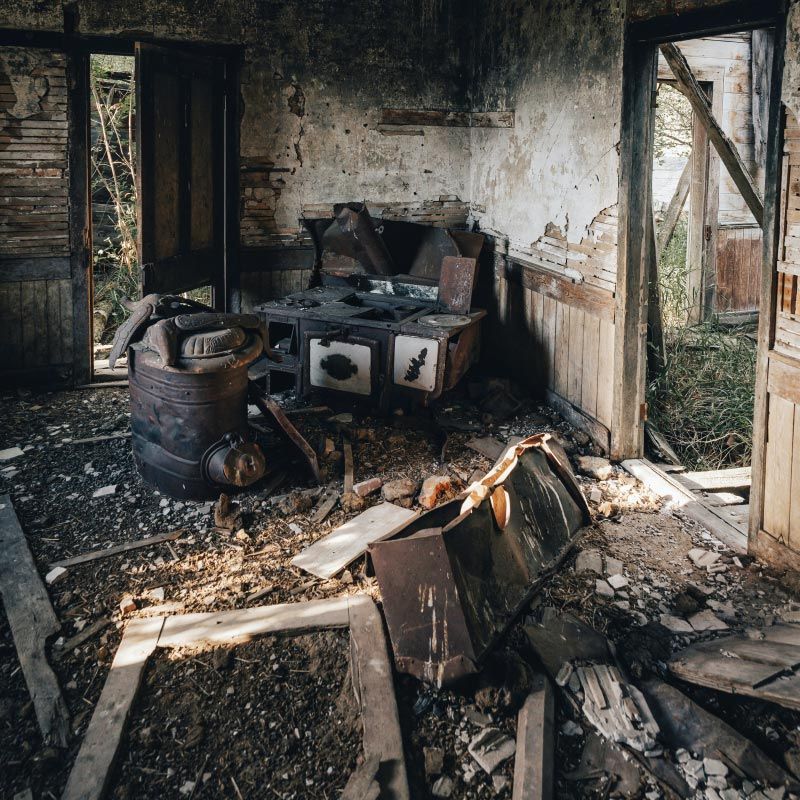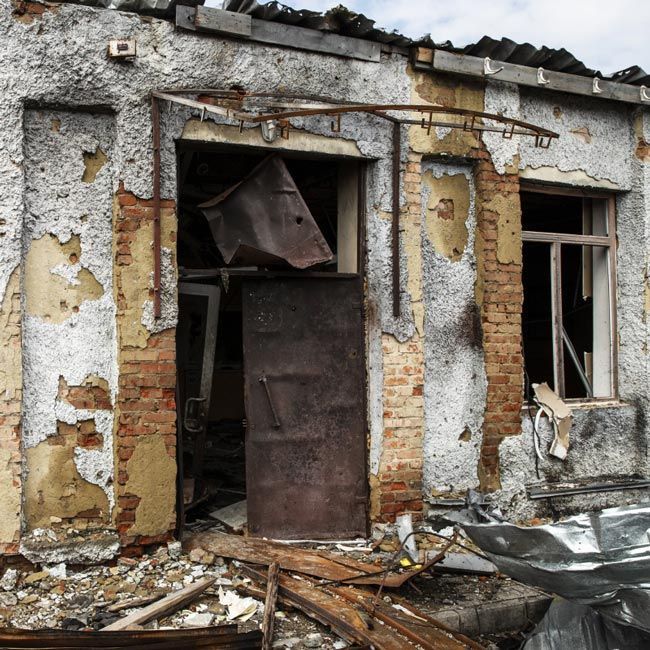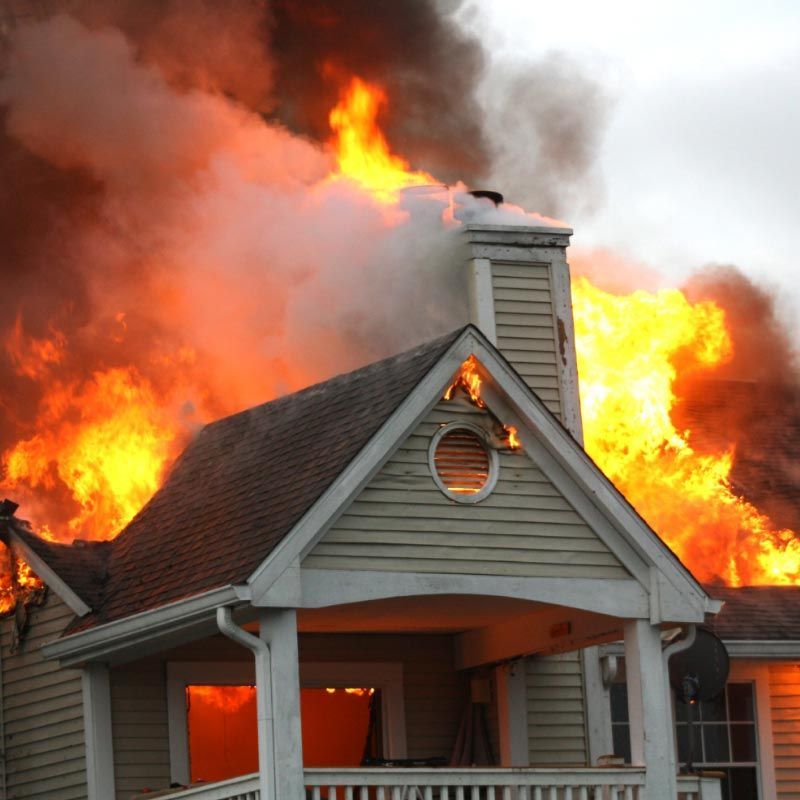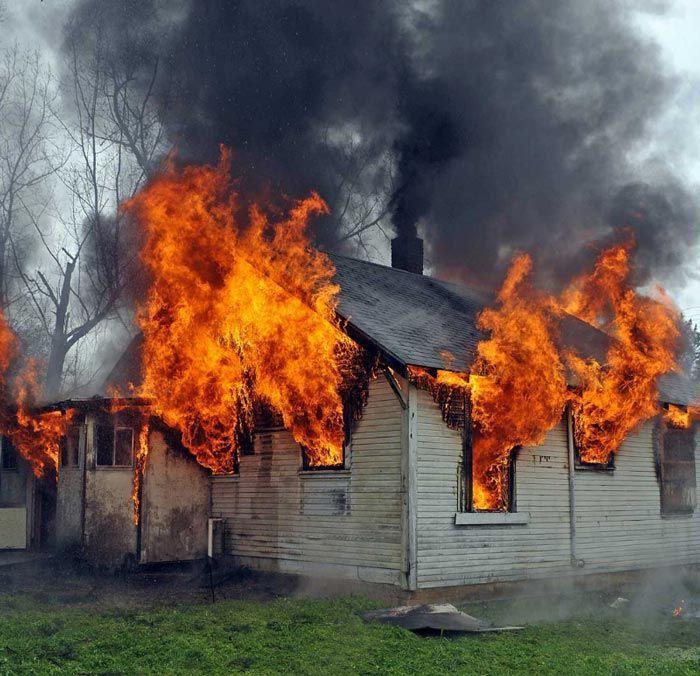HOW TO REMOVE THE SMELL OF SMOKE FROM A HOME DAMAGED BY FIRE
Free Offer Form
We will get back to you as soon as possible.
Please try again later.
After a house fire, repairing the damage could take months. But even after addressing further damage, the smoke odors may linger.
Smoke odor clings onto your personal belongings, carpets, and walls, spreading throughout your home. The smoke damage can be
detrimental to your health and make rehabilitation difficult.
However, there are ways to get rid of smoke odors. From using a ventilation system to deep cleaning, eliminating smoke odor damage is very possible.
Our guide on
how to get rid of fire smoke smell in house gives a complete run-down on all the cleaning solutions you need.
EVALUATING THE SMOKE DAMAGE
While some property owners may believe that only the room where the house fire occurs is directly affected by smoke odors, that's untrue.
Smoke damage spreads to different rooms throughout your home. The smoke is acidic, and nearby furniture, walls, and floors absorb the smoke molecules.
Within a few hours, smoke odor will be absorbed by personal items.
Smoke odor damage could render furniture unsalvageable, and long-term inhalation causes respiratory issues.
Along with smoke odors, inhaling soot is dangerous. Even after washing walls or using scented candles, it's hard to get rid of smoke and soot since these scents linger.
Removing smoke odors is crucial, as smoke molecules will negatively affect the air quality and health.
Elements Influencing Smoke Odor Eradication
Several factors affect smoke odor eradication:
- Soot Type: Dry soot is easier to clean, requiring a sponge, warm water, and mild detergent. Oily soot requires special techniques that should only be done by professionals.
- Fire-Damage Area Size: Smaller areas take less cleaning time, while larger areas can take months to get rid of.
- Fire Size: Larger fires release more smoke particles, requiring more cleaning time.
- Delay After Fire: Delayed cleanup action will make the cleanup to remove smoke odor a lengthier process.
- Type of Materials Burned: Different household materials react differently to smoke particles:
- Porous Hard Surfaces (drywall, wood): These materials become discolored due to smoke damage.
- Metallic Surfaces: Metals corrode and rust from smoke exposure.
- Metallic Appliances: Smoke particles can cling onto wires, causing electrical damage.
- Plastic and PVC: These items gather more smoke particles, making cleaning difficult.
While smoke odor removal services are helpful, they're an added expense.
Exploring cost-effective ways to remove soot and smoke can help save money and time.
Safety Measures in Smoke Damage Management
Staying safe while cleaning is important, especially if you don't have prior cleanup experience.
Do not jump into a do-it-yourself process. Washing walls, doors, or carpets without safety precautions can spread smoke particles and soot.
These are important safety reminders while you remove smoke odor:
- Check That the Area Is Safe: Ensure there's no risk of furniture breaking or walls falling on you.
- Wear Personal Protective Equipment: Wear gloves, masks, and eye protection goggles while cleaning.
- Ventilate the Smoke: Open windows or doors to let fresh air in. If you have an HVAC system, turn it off to avoid spreading smoke particles.
After ensuring your safety, the smoke removal process begins.
PROCEDURE TO ELIMINATE SMOKE ODOR
Removing smoke odor throughout your home requires different methods depending on the materials burned.
Regardless of the material, proper ventilation is crucial in ensuring you do not risk your health.
Ventilation: The Initial Step
Letting fresh air in helps get rid of health risks from the fire smoke smell. A ventilation system decreases respiratory issues and speeds cleaning up.
Fans and air purifiers with a HEPA filter ventilate the room, as carbon-based materials within the air filter absorb particles and get rid of the smoke odor.
When using fans, position them toward open doors or windows to eliminate toxic particles.
Remove window screens to improve air circulation.
Cleaning Affected Areas
The next step in post-fire cleaning is to deep clean throughout your home.
Deep cleaning removes smoke odors from materials that've been directly affected. Depending on the material, getting rid of the smell may take hours or days.
Walls, clothing, upholstery, and carpets absorb smoke particles differently and require unique cleaning methods.
Textiles
Most houses are full of textiles, which are typically made from woven fibers. These fibers make up fabrics like clothing, upholstered furniture, and carpets.
Fibers quickly absorb smoke; masking it with scented candles or a mild detergent is ineffective. Homeowners will need to act quickly to eliminate the smoke smell.
One way to remove smoke smells on textiles is by putting baking soda on them. Baking soda works as a pH neutralizer, removing the smoke's acidity.
Add it to your wash cycle or sprinkle it on carpets. Otherwise, white vinegar is a good alternative.
White vinegar has acetic acid, neutralizing the smoke smell. Add white vinegar into your wash cycle and dilute it with warm water.
Or, create a vinegar, water, and dish soap mixture and use it on carpets, clothing, or upholstery.
The following are also good alternatives:
- Activated Charcoal: Activated charcoal absorbs the fire smoke smell and may be placed in bowls on certain corners around the house to absorb the scent.
- Deodorizing Spray: Deodorizing sprays have odor-eliminating agents that bind with smoke, changing its chemical structure and reducing the smell.
- Laundry Scent Booster: Scent boosters use fragrance pellets that dissolve in water, letting fragrant smells stick onto textiles and remove odors.
- Air Dry: Using fresh air is an earth-friendly option. Air-drying clothing or upholstery may somewhat remove smoky smells.
- Washing in Hot Water: Hot water loosens fabric fibers, allowing cleaning solutions to access smoke molecules. Note that not all textiles can be washed in hot water.
Glass Surfaces
Glass materials, like windows or mirrors, are hard surfaces susceptible to oily fire smoke and soot. Their oily structure makes cleaning difficult with just mild soap.
Only using dish soap and cloth to wipe away soot spreads it further, causing a lingering odor. Discoloration may also occur.
Use glass surface cleaners to remove the smoke smell or combine white vinegar with water, dish soap, and lemon to wipe glass surfaces.
Homeowners can also use newspapers made of strong fibers.
Here's how to start cleaning with newspapers:
- Spray a cleaning solution onto the exposed glass surface.
- Ball up a piece of newspaper to a palm-sized shape.
- Use the newspaper to rub the glass cleaner around the glass in a circular motion.
Whether you use glass cleaners or DIY solutions, be patient. The smoke smell and discoloration may take time to remove, so be prepared for multiple cleaning sessions.
Hard Surfaces
Hard surfaces like walls, doors, or uncarpeted floors easily absorb fire smoke smell.
Using white vinegar to wipe away further damage from soot helps remove dirt and bacteria.
Due to white vinegar's strong smell, dilute it with water and thoroughly wash away soot from walls or floors.
A steam cleaner is a good alternative if the above mixture isn't strong enough to remove the soot or odor.
A steam cleaner breaks down the smoke's sticky tar and resin. However, avoid using one to clean delicate fabrics, drywall, and unsealed wood or stone.
Floor Coverings
Carpets and rugs are notorious for keeping the smoke smell within their fibers for long periods.
Besides sprinkling baking soda on top of the affected item, try cleaning it with a vacuum cleaner or using a fabric refreshing spray. Steam carpet cleaners can also work well.
Purifying HVAC Systems and Air Ducts
A heating, ventilation, and air conditioning (HVAC) system controls internal temperatures.
Though not every house has a full HVAC system, you may have a version of it if you use a fan or heater.
After a house fire, an HVAC's system and air ducts will get clogged with soot and fire smoke odor. This affects the house's air quality, increasing health risks.
To combat this, immediately replace your system's filters. Hire professionals to clean air ducts or existing filters.
Invest in an advanced HEPA filter that removes fire smoke odor particles. Keeping your HVAC system and air ducts dry-cleaned ensures no fire smoke particles linger in the air.
Intensive Cleaning and Structural Purification
Homeowners will need to inspect the inside and outside of certain materials to ensure they don't have leftover soot or fire smoke odor.
Cleaning upholstery and other surfaces with white vinegar and replacing filters are intensive cleaning methods.
Though minor blemishes can be dealt with using DIY methods, extensive fire smoke damage requires professional help.
These professionals play a crucial role in the restoration of a damaged house.
If you intend to sell your home, ensuring the structural purification process goes smoothly is essential in rebuilding the home to its pre-fire look.
Can I Sell a Fire Damaged House National?
Yes. You can sell a fire-damaged house. However, it may be harder to sell in the local National real estate market in as-is condition. You would have to make repairs and possibly rebuild most parts of your house before a buyer takes interest in the property. Your best option when selling a fire-damaged house is a cash buyer. They buy burned houses as-is so you don't need to spend money on repairs. They'll handle all the cleanups and renovations for you, however, expect that their offer may be below the cash value of your property.
TOOLS AND SUBSTANCES TO NEUTRALIZE FIRE SMOKE ODOR
There are various tools for fire smoke smell removal, and their use depends on the item you're cleaning and the severity of the smoke smell.
Domestic or ordinary household cleaning items are good for mild to moderate smoke odor cases. Industrial products or machines are better for severe cases or when domestic items fail to remove the odor.
Domestic Items
These are simple and affordable domestic items that can get rid of a strong smokey smell:
- Baking soda
- White vinegar
- Lemon juice
- Activated charcoal
- Odor-absorbing gel beads
- Fabric softener sprays
- Coffee grounds
- Hydrogen peroxide
- Essential oils like lavender or citrus
Since vinegar, lemon juice, and hydrogen peroxide are acidic chemicals, ensure you dilute them with water before using them on upholstery or other furniture.
Coffee grounds and activated charcoal can quickly absorb the smoke smell and may be placed in bowls around the house.
Industrial Products
Industrial products are items that cost more and require more care to use. They aren't as accessible but work better for stronger smoke-smell cases.
These are examples of industrial products:
- Ozone generators
- Commercial odor absorbers
- Smoke odor-neutralizing sprays
- Enzyme-based odor eliminators
- Neutralizing agents
- Carpet cleaners with odor-neutralizing solutions
- Odor encapsulating sealers
- Disinfectants and cleaners
Only use industrial products if the damage is severe or has spread through most of the house or apartment building.
Machines and Gadgets
Some machines or gadgets are easier to find than others, and using them depends on how strong the smell is.
These machines help against the smoke smell in varying ways:
- HEPA air purifiers
- Steam cleaners
- Ozone generators
- Ultrasonic cleaning machines
- Fogging machines
- Ionizers
- Hydroxyl generators
- Thermal foggers
- UV light air purifiers
- Wet/dry vacuums
Before purchasing any of these items, research whether you need them or if regular items around the house will suffice.
DURATION FOR SMOKE ODOR TO NATURALLY VANISH
You might think, "What if I just let the smoke odor disappear?"
While smoke odor naturally vanishes after some time has passed since the house fire, stronger smells do not go away as easily.
Depending on the fire severity, the materials burned, and the cleaning supplies used, the odor may linger on walls and upholstery for months.
Smoke can be stubborn, especially if the affected items absorbed large amounts of smoke and were allowed to linger.
Even with several intensive cleaning sessions, odors may remain throughout the house.
Immediate cleaning
and purification may speed up the cleaning process.
Elements Influencing the Timeframe
Multiple elements affect the fire smoke odor duration:
- Fire Severity: The more fire damage a house receives, the longer it will take to remove any leftover smoke odors.
- Ventilation: The cleanup duration shortens if you properly ventilate the house while removing the smoke odor. A house with poor or no ventilation keeps smoke particles stuck on various items.
- Burned Material Types: Different materials release varying smoke molecules. Synthetic materials produce more stubborn fire smoke smells than burned wood.
- Environmental Conditions: The fire cleanup timeline changes if the weather is hotter or colder. Warmer weather and low humidity speed up the timeline, while the cold lengthens it.
- Fire Damage Size: Larger damaged areas mean longer timeframes, especially if there's poor ventilation or the cleaning has been delayed.
Though the fire's severity, environmental conditions, and burned material types typically can't be controlled, how we clean the smoke smell directly affects the recovery timeline.
Accelerating the Process
Speeding up smoke odor eradication depends on the following:
- Ensure proper ventilation by keeping doors and windows open, using fans, and investing in air purifiers.
- Keep all items and surfaces dry-cleaned through cleaning agents, solutions, and consistent cleaning techniques. Focus on areas with heavy smoke smells, like upholstery or walls.
- Use steam cleaning on carpets, rugs, and other fabrics to remove embedded smoke molecules quickly.
- An ozone generator releases powerful oxidizing agents that break down odor-causing molecules. However, use this sparingly, as high ozone exposure is dangerous.
- Repaint walls and ceilings with special odor-sealing paint.
- Place odor absorbers, like activated charcoal or coffee grounds, in bowls around the house.
Hiring a professional smoke odor removal service is necessary if the above methods don't work due to severe damage.
The Process of Selling Fire Damaged Property to a Cash Buyer
The process of getting a cash offer for a burned house is pretty much the same as any property type. However, it is best if you can contact your home insurance company first before getting an offer for your house after a fire. Your National home insurance company can help assess the extent of the fire damage as well as the repair costs. This can help you decide whether selling a house as-is to a cash buyer is really the right path to take. Once you have decided that you really want to get a cash offer, here are the next steps you should take.
Important note: This doesn't apply to all cash buying companies.
1. Request a Cash Offer
You can easily find cash buyers in your area by searching online. Once you found a reputable cash buyer, head over to their website to fill out a form or give them a call to ask for a cash offer. Most cash buyers and real estate investors give no-obligation cash offers so you can still ask other cash buying companies how much they can buy your fire-damaged property. If you are unsure about the background of a cash buyer, you can always ask them for proof of their source of funds.
2. Welcome the Cash Buyer into Your Home
The cash buyer or real estate investor may want to check your fire-damaged property for the repairs and improvements it needs, especially its roofing, walls, foundation, etc. You won't have to pay for these repairs when selling a National house to them, but experienced home buyers or real estate investors consider repair costs to make an accurate cash offer.
3. Review the Contract and Sign
Once you accept the cash buyer's offer on your fire-damaged home, they would furnish a sales contract and send it to you electronically. You will be given time to go over the terms and ask questions. After everything is settled, sign the contract to make the deal with the National cash home buyer official.
4. Closing
During closing, expect less paperwork since there are no lenders involved. After you have signed the minimal necessary paperwork and the National deed is transferred to the cash buyer's name, you'll get your cash in your bank account. If you aren't confident attending the closing by yourself, bring a real estate attorney with you.
5. Set Your Preferred Day to Move-Out
If the property has minor fire damage and you are still living in it, communicate to the cash home buyer when you want to move out. This is also a good time to ask for a sale-leaseback agreement if you don't have a place to crash on while you are still looking for a new National home.
WHEN TO ENGAGE A PROFESSIONAL SMOKE ODOR ERADICATION SERVICE
Though using a do-it-yourself cleanup method lessens expenses, not all methods will work. If you have no cleaning experience, you may even exacerbate the smokey odor.
If the damage is too severe to clean on your own or no simpler methods help, consider hiring a smoke odor eradication service.
They're trained professionals who utilize industrial tools that quickly remove odors in various areas around the house.
Determining the Gravity of the Scenario
Severe damage isn't the only factor that requires professional help.
If there are lingering health risks after the fire, such as poor air quality, then cleaning it by yourself is unsafe.
Professional services handle the stress of rebuilding while you focus on other aspects.
If you intend to sell the house after rebuilding it, hiring a professional service ensures no smoke odor remains.
Before investing in hiring a service, check if your insurance policy has coverage for these added expenses.
Advantages of Professional Sanitation
Professional sanitation services have more cleaning experience and are trained to handle varying levels of smoke odor in the house.
Their industrial-grade equipment works better than domestic items, and they understand various cleaning methods for different burned materials.
Not only do they guarantee peace of mind with their expertise, but hiring them is a cost-effective, faster way of removing smoke smells versus buying cleaning materials yourself.
They follow health standards, reducing the risk of contamination. Regardless of the house size or type, they should know how to clean all areas, shortening the cleanup timeline.
IMPACT OF SMOKE SMELL ON HEALTH
A fire damages your home and has long-lasting effects on your health.
If you weren't physically injured in the fire, you may still hurt your lungs by inhaling smoke. You risk severe health risks if the smoke isn't cleaned from the furniture, walls, or the entire house.
Acting quickly to remove smoke scents ensures everyone's safety after the fire.
Potential Health Risks
Inhaling smoke causes respiratory issues, ranging from constant coughing to nasal congestion.
People who already have respiratory issues, like asthma or allergic rhinitis, are more likely to experience worse symptoms in smokey areas.
Smoke causes itchy eyes and a sore throat. Severe cases can leave people struggling with headaches, nausea, elevated blood pressure, and reduced oxygen delivery throughout the body.
Long-Term Consequences
Prolonged smoke inhalation causes severe health issues, such as respiratory ailments, cardiovascular diseases, and lung cancer.
Not only do these toxic chemicals affect us physically, but the long-term consequences post-fire are mentally damaging.
Constantly smelling smoke causes discomfort and an uneasy feeling, potentially increasing the incidence of depression, trauma, and anxiety.
Fire survivors may mentally relive the fire constantly if they always smell smoke.
MAINTENANCE AND PREVENTION MEASURES
The aftermath of a fire is often a devastating, stressful experience for anyone. However, the good news is that maintaining a clean, smoke-free home is possible.
Even after all the smells have gone, preventative measures must be regularly taken to ensure your health and home are not at risk.
Regular Cleaning
Maintain a consistent cleaning schedule and avoid leaving dusty areas unattended. Even after you have cleaned up all remaining soot, smaller particles may remain and mix with dust.
The combination may erupt in flames if the dust is near any heat source.
Remember to check all HVAC filters and keep easily flammable materials clean from dust and other soot sources, such as fireplaces.
Smoke Detectors and Fire Safety
If you're wondering how to prevent house fires, a great way is to install smoke detectors. Smoke detectors can quickly alert you of a fire before it escalates.
The best smoke detector placement in home is on the ceiling of every sleeping area, outside each bedroom, near the kitchen, and on every level of the home.
Practicing basic fire safety is crucial in ensuring fires do not happen again. Create up-to-date escape routes, avoid high fire sources, and keep your home clean.
Importance of Good Ventilation
Smoke scents are less likely to disappear without good ventilation, regardless of whether you use industrial-grade cleaning equipment or common household items.
Ensuring proper ventilation is done whenever you clean keeps you safe from lingering scents while simultaneously speeding up cleaning.
As the air flows through your home, it carries away the toxic molecules. It keeps your lungs healthy and prevents the particles from sticking more to other surfaces.
Using air purifiers, freshening sprays, or simply keeping your windows open can all help improve ventilation and reduce health risks.
Frequently Asked Questions
Learn more about how to get rid of smokey smells with these quick questions and answers.
How Long Does It Take for Smoke Smell to Naturally Dissipate?
The duration can range from days to months, depending on the severity of the fire. The leftover scent from severe fires will take longer to naturally vanish.
The speed at which a person cleans out the smokey smell also impacts the timeline. The cleanup duration lengthens if no immediate action is taken after the fire dies.
What Household Items Can I Use to Neutralize Fire Smoke Smell?
To get rid of the smokey smell, use baking soda, white vinegar, lemon juice, and coffee grounds. Note that not all household items are cleanable.
To know what to throw away after smoke damage, check which items were significantly damaged, melted, or exposed to the fire. If they're rendered useless, throw them away.
How Can I Clean My HVAC System to Remove Smoke Smell?
Remove the filter from the HVAC system, wash it with a wet cloth, and then dust away visible soot. You can install a HEPA filter with activated charcoal to absorb and eliminate lingering smoke particles.
When Should I Consider Calling a Professional Smoke Odor Removal Company?
Call a professional smoke odor removal company in the following cases:
- The house was severely damaged by the fire
- Other cleaning methods failed
- Too much time has passed since the fire, and the smoke has stuck too long on surfaces
Are There Any Health Risks Associated With Smoke Residue?
Prolonged smoke inhalation leads to respiratory, eyesight, and mental health issues. Severe cases may trigger cancer and heart diseases.
Conclusion
Our first instinct is to act quickly and eliminate a heat source when fires strike.
The same instinct applies to removing the smokey smell lingering in your home
after the fire dies down. Using either household items or industrial equipment is important in ensuring that everyone's health will not be compromised.
Before cleaning anything, check that there is proper ventilation in the room. Use baking soda, white vinegar, or cleaning sprays on the affected surface or item.
If the smokey smell does not disappear, consider hiring a professional cleaning service.
Remember to practice basic fire safety. Knowing how to avoid fires saves you and your house from a long-lasting, stubborn smokey smell.
National Resources
- Selling a Fire Damaged House National
- Selling Inherited Property National
- Selling a House in Probate National
- How to Sell a House by Owner National
- How to Sell Rental Property National
- Stop Foreclosure National
- Selling a House during Divorce National
- How to Sell a Hoarder House National
- Can You Sell a Condemned House National?
- Can You Sell a House in Foreclosure National?
- How to Sell Rental Property with Tenants National
- Taxes on Selling a House National
Free Offer Form
We will get back to you as soon as possible.
Please try again later.
Author: Chris Charles
We buy fire damaged houses because we like taking on the challenge and making a win win for sellers looking to sell. We work with our partners nationwide and are experienced in dealing with the city if its already been condemned. Request a cash offer to have a chat with us today.
Sell Fire Damaged House for Cash Quick
Sell Your House Fast, To A Legitimate House Buying Company You Can Count On. ✔️ Free, Easy & ✔️ No Pressure Process. Find Out How We Buy Houses!
Sell Fire Damage House in California
Sell Fire Damaged House in Ohio
Sell Fire Damaged House In North Carolina
Sell Fire Damaged House In Michigan
Sell Fire Damaged House In Massachusetts
Sell Fire Damaged House In Colorado
Sell Fire Damaged House In Minnesota
Sell Fire Damaged House In South Carolina
Sell Fire Damaged House In Alabama
Sell Fire Damaged House In Louisiana
Sell Fire Damaged House In New Hampshire
Sell Fire Damaged House In Maine
Sell Fire Damage House in Texas
Sell Fire Damaged House in Florida
Sell Fire Damaged House In New Jersey
Sell Fire Damaged House In Virginia
Sell Fire Damaged House In Indiana
Sell Fire Damaged House In Kentucky
Sell Fire Damaged House In Oregon
Sell Fire Damaged House In Oklahoma
Sell Fire Damaged House In Connecticut
Sell Fire Damaged House In Utah
Sell Fire Damaged House In Rhode Island
Sell Fire Damaged House In Delaware
Sell Fire Damaged House in Pennsylvania
Sell Fire Damaged House in New York
Sell Fire Damaged House In Washington
Sell Fire Damaged House In Arizona
Sell Fire Damaged House In Missouri
Sell Fire Damaged House In Nevada
Sell Fire Damaged House In Iowa
Sell Fire Damaged House In Arkansas
Sell Fire Damaged House In Mississippi
Sell Fire Damaged House In Kansas
Sell Fire Damaged House In North Dakota
Sell Fire Damaged House In Alaska
Sell Fire Damaged House in Georgia
Sell Fire Damaged House in Illinois
Sell Fire Damaged House In Tennessee
Sell Fire Damaged House In Maryland
Sell Fire Damaged House In Wisconsin
Sell Fire Damaged House In New Mexico
Sell Fire Damaged House In Idaho
Sell Fire Damaged House In Nebraska
Sell Fire Damaged House In West Virginia
Sell Fire Damaged House In Hawaii
Sell Fire Damaged House In Vermont






